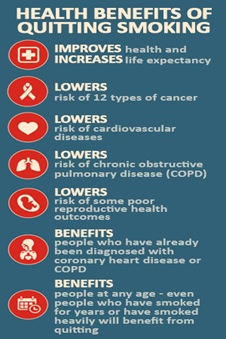Smoking Tobacco and Your Health
Written By Tanjit Minhas, Registered Respiratory Therapist
Smoking tobacco is known to be the leading cause of preventable death and number one preventable cause of lung cancer. In fact, according to the Canadian Lung Association, tobacco is considered to be the number one cause of preventable death and disease in Canada with roughly 48, 000 Canadians that die each year due to smoking. An estimated 15 per cent of Canadians currently smoke despite numerous preventative measures and public health education efforts in place. Quitting smoking is the single most important step that a smoker can take to improve not only the length, but also their quality of life. Quitting smoking is not an easy task, but it is definitely possible. Although it can be difficult to quit smoking tobacco, there are many things that can be done to increase the chance at successfully quitting. 
Why is it important for me to quit smoking?
Many individuals are not aware of the harm or the serious impact that smoking tobacco can have on their health. Not all smokers will know that it can cause cancer, heart disease, stroke and/or lung disease including chronic obstructive pulmonary disease (COPD). Not all smokers will be aware that it can increase the risk for tuberculosis, certain eye diseases, increase blood sugar levels leading to diabetes, and even cause issues of the immune system. If you are pregnant and smoke tobacco, you may not be aware that it can increase risks for pregnancy complications. Individuals that are already living with COPD and/or Asthma struggle to maintain a clear airway, and many of them will not know that when exposed to tobacco smoke, it can cause symptoms to occur or worsen existing ones. These symptoms can include redness from lung irritation, swelling, excess mucus production or lead to a flare up that may cause an individual to cough, feel short of breath, experience chest tightness or have trouble breathing.
Why is it difficult to quit?
Nicotine, the main addictive drug in tobacco is what makes it difficult to quit. Cigarettes are designed to allow a rapid delivery of nicotine to your brain. The nicotine will stimulate areas within your brain and trigger a release of specific chemicals that will make you feel good. With continuous use, your brain will not only get used to having nicotine, but it will make you feel as though you need it to feel okay. It is also common to develop nicotine withdrawal symptoms that can also make it more difficult to quit. Common withdrawal symptoms can include insomnia, hunger, restlessness, anxiety and irritability. Many individuals that smoke will tell you that the first week after quitting is often the most difficult. Knowing what to expect and deciding ahead of time what you will do to overcome and cope with cravings will increase your likelihood of success.

Today’s Coping Strategies:
There are seven strategies I propose that may help to successfully quit smoking:
Strategy 1: Write down reasons why you want to quit
Remind yourself regularly or when faced with challenges of the reasons why you want to quit. This can include saving money, health reasons, or just to be able to spend more time with your grandchildren.
Strategy 2: Talk to your doctor and discuss treatment options
Your physician may provide you with support, discuss medication options to help you improve your chances of quitting and/or refer you to counselling for additional assistance.
Strategy 3: Make a plan & set a quit date
Pick a day, mark it on a calendar, and remove all items that make tempt you to smoke the night before. This can include removing cigarette packs, lighters, ash trays etc.
Strategy 4: Inform your family members and friends about your goal to quit smoking
Support systems can celebrate progress with you, help you change routines and remind you of your goals.
Strategy 5: Understand the reason that you smoke & manage potential stress
By understanding the drive for your cigarettes, including whether it is due to stress, boredom, habit or part of socializing, you can gain better control of your actions and know whether further support is necessary. This can include seeking out support groups and/or counselling.
Strategy 6: Prepare for potential slips
Avoid others who smoke or ask them not to smoke around you. Avoid taking any smoke breaks. If you slip, do not get discouraged as this is common. Instead, learn from the mistake and prepare for next time.
Strategy 7: Celebrate your success
Celebrate your health by going out to eat, try out a new hobby or even play a new sport as you may be able to taste food better, have more energy and notice your breathing became easier. Also celebrate your savings by buying new clothes, taking road trip, our go out for a movie with friends.

Always try your best to remember the reasons why you want to quit. If you would like more assurance as to why you should quit now, consider the following benefits:
Benefit 1: Saves you money on smoking products
Calculate how much you typically spend on cigarettes and think about how much money you will save, especially as the cost of cigarettes continues to rise.
Benefit 2: Lowers your risk of respiratory issues and other illnesses
Quitting smoking will lower risks of chronic obstructive pulmonary disease (COPD), heart attacks and strokes.
Benefit 3: Immediate effects
Soon after quitting, many individuals will have lower heart rates, lower levels of toxic carbon monoxide and have improved lung function. You may also notice improved sense of taste and smell, better sleep, and fewer colds.
Benefit 4: Allows you to breathe easier
Quitting smoking will reduce the risk of developing Chronic Obstructive Pulmonary Disease (COPD) or slow the progression of existing COPD diagnosis. Quitting smoking will reduce loss of lung function over time. By quitting, you can also reduce respiratory symptoms that can include wheezing, cough and phlegm production, allowing you to breathe easier.
The Smoking Treatment for Ontario Patients (STOP) program offered at Central Brampton FHT:
This program is funded by the Ontario Ministry of Health as an initiative across the province to offer counselling and smoking cessation treatment to help support individual’s who wish to quit or reduce their tobacco use. Individuals that are enrolled in this program can have access to tobacco dependence treatment, including nicotine replacement therapies (NRT), that is FREE OF CHARGE through partnerships among community health care organizations. Speak with your doctor today if you are interested in enrolling in our STOP program as you may be referred for a consultation with one of our our smoking cessation counsellors made up of our Respiratory Therapist and Pharmacist team.
Whether you are ready to quit for the first time, have tried before and ready to try again, or are helping someone else quit, it is never too late to quit. Finding the right support for you, whether this includes reaching or to experts who can get you started on a quit plan, combination of tools and/or medications are steps that you can take to increase your chances of success. Above all, always remember not to give up!
Do you think you have Chronic Obstructive Pulmonary Disease (COPD)? Take this quick Canadian Lung Health Test to screen for symptoms of COPD:
If you are over the age of 40 and smoke, or used to smoke, and answer yes to one or more of the following questions, speak with your doctor about spirometry testing (a breathing test) offered here at Central Brampton Family Health Team!
- Do you cough regularly?
- Do you cough up phlegm regularly?
- Do even simple chores make you short of breath?
- Do you wheeze when you exert yourself, or at night?
- Do you get frequent colds that persist longer than those of other people you know?

